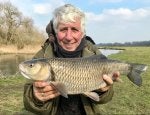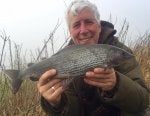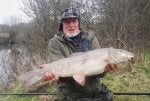Cliff Hatton
Well-known member
So how was your river season this backend? Unless you lived somewhere with a benign micro climate I’ll wager ‘a pound to a pinch’ that it’s not been one of the best. I usually love the period from Xmas until we are chucked off the rivers on March 15th (more of that later) but in just a few short weeks 2018 has delivered every sort of weather conditions imaginable.

How is it we can’t keep on catching beautiful fish like this when they are as ‘fit as butcher’s dogs’ at the end of March and yet its ok to fish for them when they are at their weakest on June 16th ?
Like many anglers I’ve got a few days leave booked to take advantage of what should be a prime period when the fish are fighting fit and feeding well. As the last of the snow melts here in the Thames Valley all thoughts of fishing this weekend have been abandoned. Instead I find myself anxiously checking the EA river gauges to try and work out where will be fishable in the time left to us. My friend Keith Elliott has a cottage booked all week at Burgate on the Hampshire Avon and I’m due to spend a couple of days with him down there chasing roach and chub along with a trip to the Dorset Frome in search of some big backend grayling. We already know that the first half of the week will be a wash out and I’m sure many others will have had their fishing plans similarly disrupted.

Will the snowmelt put pay to some more big back end grayling for me this year?
And it’s not just the recent ‘Beast from the East’ that buggered up the fishing this winter. An exceptionally dry summer and autumn saw winter levels at near record lows in many areas with government agencies and water companies making plans for drought measures later in the year. Low, clear rivers seldom fish well and the Xmas holiday period was a struggle for many. When the rains came it was a mixed blessing. Here in the South East we welcomed them as the rivers recovered and the reservoirs filled up but further north the floods saw matches cancelled and reduced fishing opportunities for many as the end of the season approached.
Not All Bad
But it wasn’t all bad and those of us with ‘flexible working arrangements’ and a good eye for the weather managed to get out on the banks of the Thames and its tributaries during those all too brief periods where water temperature and river flows combine favourably.
I’ve written before about the wonderful revival of roach fishing on the Thames and whilst the redfins did their usual disappearing act in the fluctuating conditions the chub and barbel more than compensated at times. The best of the chub anglers I know on the middle river all had their share of five and six pound fish with the pick of the bunch falling to local matchman Stu Keable who landed a 7.10 cracker on a pleasure session on a bitterly cold day. As well as the big fish it was heartening to see that the chublets are now very much in evidence in the river along with plenty of fish from a half to one and half pounds. Great news for the future as I for one don’t like the prospect of fishing in an ‘old folks home’ where the fish are big for a while and recruitment is poor to non-existent.

The Thames continues to impress as Stu Keable demonstrates with this stunning 7.10 chub from the middle reaches
Conditions usually have to be spot on to be in with a chance of a Middle Thames barbel and there’s nobody more adept at being there at the right time with the right method than my good friend and former match ace Bob Wyatt. During a mild spell earlier in the year Bob landed fish over 12lbs and in the recent weather window he racked up several more, including a brace of doubles in a day which is a rare feat indeed on this river. Further downstream on the Twyford and District stretch of the St Patrick’s Stream – a Thames tributary pronounced ‘ottered out’ by the usual suspects – barbel anglers enjoyed their best season for several years with pride of place going to club fishery officer Garry Brecht with a stunning 18.02 specimen.

A wonderful backend barbel from the St Patrick Stream for Garry Brecht of Twyford&DFC.

Former Thames match ace Bob Wyatt with one of a brace of double figure barbel from the river last month.
My own winter fishing has been decidedly mixed. I’m yet to land a roach worth photographing and a combination of gin clear water on the Kennet & Avon and some horrendous habitat destruction by the Canal and Rivers Trust on two favourite stretches has meant that my tally of big perch is looking rather tame. However, a trip to the middle Avon with my good friend Sean Geer more than made up for an indifferent period. Apart from choosing a day with a horrendous downstream north easterly wind, which tested our float fishing skills to the maximum, the river had good colour and flow. It took a couple of hours to get the fish feeding and even then they were incredibly wary. Eventually two beautiful chub succumbed to a single red maggot on a size 20 to an 0.11mm hook link, with the biggest a stunning 6.05 specimen – a personal best for me from the Avon. Although it might have been possible to tempt a couple more I was more than happy with this brace and to go finer for these tree hugging big fish would have been suicide in such a powerful flow.
Will the river close season ever change?
As we approach the middle of March there is always a flurry of views expressed on the vexed issue of the English close season for coarse fishing on rivers and this year will be no exception.
So why is it that we have any sort of closure at all and, even more strangely, why at these times? Any regular river angler knows that most of our target species – roach, bream, perch, chub and barbel – don’t even think about spawning until the end of April or early May and some are still at it long after the season reopens on June 16th. Furthermore we have seen the removal of the close season on stillwaters and canals, following byelaw changes in the 1990s and 2000, with no demonstrable impact on fish stocks.
It is this latter argument that is regularly deployed by those in favour of complete abolition. They also point out that fish, like humans, rarely feed when engaged in reproductive activity. By contrast those in favour of retaining the three month break talk about the danger of disrupting spawning aggregations by angling activity and the need to give both the fish and the bankside a rest from human interventions.
There is some merit in both these contrasting viewpoints but until recently very little evidence has been available to inform the debate and move us closer to a resolution.
History of the coarse fish close season
Science and evidence were the last things on the minds of those who originally introduced the close season back in 1878. This was a time before keepnets and unhooking mats when most fish were killed and eaten. Anglers realised that they were endangering their sport by removing gravid fish before they had had a chance to spawn and the Sheffield anglers persuaded their MP – Mr A J Mundella (Liberal) to: “do his best to carry through Parliament a Bill that will provide a time which will permit of freshwater fish completing the procreation of their species in peace and quiet.” They originally wanted the months of March, April and May ‘fenced off’ according to the species of fish, for example, no taking of barbel or carp in May or June but this was not acceptable to the London angling clubs who wanted to carrying on fishing to the end of March. There followed bitter disagreement between Sheffield and London over the closed period as the experts of the day differed as to the exact periods for the different species of fish. Eventually a good old fashioned English compromise was achieved by splitting the difference between the two sides leading to the entirely unscientific closure period we have now.
If you want to read more on the history of the coarse fishing close season check out this excellent piece by John Essex HERE
Fast forward a hundred years or so and the Salmon and Freshwater Fisheries Review in 2000 which recommended “…..to abolish the close season for coarse fish on canals and rivers except where its retention is necessary to avert serious damage to fish stocks”.
The Government accepted this in principle but endorsed the Environment Agency’s view that “…such a proposal should be based on sound science, that at present there is inadequate information on rivers and that no decision should be taken until further evidence is available.”
Recent polling has demonstrated that the river close season is a live issue amongst anglers, especially around the Midlands where the Severn can be unfishable for weeks on end. With climate change delivering more and more extreme weather we are now facing the prospect of an effective six month shut down on many rivers. Not something that was ever envisaged in the 19th century when the current closures were introduced.
Here at the Angling Trust we have responded to these concerns and pressed the Environment Agency to conduct a full review which puts some long overdue science on the table to enable a sensible decision to be made about when and if we should be stopped by law from going fishing.
The Review
The Environment Agency set up a consultative panel in 2015 to guide their work, which has included a review of arrangements in other countries and examination of available scientific studies. The group has been chaired by Steve Axford from the IFM, who also sits from time to time on the England Fisheries Group, and contains fishery scientists and three representatives from the Angling Trust. All the Trust representatives c with very different viewpoints: Myself (reform), Pete Reading (retain) and Dave Harrell (abolish).
A planned trip to the Thames with Angling Trust Ambassador Dave Harrell had to be switched to the Kennet due to rising water levels. Dave has long argued against the current close season
The evidence paper has been approved unanimously by the whole panel and will be the subject of an EA consultation this Spring. This is not the first time the close season has been subject to review but it is the first time there has been an attempt at some serious engagement with anglers.
I set out my own views in these columns in 2014 and they have refined a little as result of looking through the evidence and experience from other countries. There is no reason why there shouldn’t be a completely separate season for pike which is a species particularly vulnerable to poor handling when not in peak condition. I’m happy to listen to more experienced pike anglers as to when this should be. The arguments about minimising bankside disturbance cut little ice on the big navigable rivers that see activity throughout the spring from boaters, canoeists, swimmers, dog walkers and the like. I also struggle to see any problems with year round fishing on mixed rivers where trout anglers regularly fish, and occasionally wade, amongst spawning coarse fish. I asked several knowledgeable river keepers about dace and grayling which are early spawners. They all told me that you simply don’t catch either when they in the act of spawning and that the dace, in particular, do a disappearing act when the time comes. This is also borne out by my own experiences and many of my fishing friends.
I guess the contentious area is on small rivers with large specimen fish that can be subject to intense fishing pressure. In these circumstances I really would like to see some sort of closure period although I do accept that this could just as easily be enforced by the clubs and fishery managers.
My good friend Keith Arthur caught bigger roach than me from the Thames this year. We have different views on the close season but both love the river with equal passion.
So in summary I believe that there remains a case for a close season on rivers but that it covers the wrong period. With the exception of pike, dace and grayling most species don’t spawn until May / June. This means, somewhat absurdly, that we currently protect the fish when they are at their fittest, prior to spawning and yet we start fishing for them when they are at the weakest. For all this talk of the ‘glorious June 16th’ the reality on most rivers is that the chub and barbel have barely recovered from their spawning rigours and can still be caught discharging milt. I cannot see how we can claim that this 140 year old, arbitrary river close season is fit for purpose in its present form.
Personally, I would like to see the closure date moved to the end of June and the period shortened – but mine is just one voice in amongst many.
When the time comes I hope that anglers take the trouble to read through the evidence paper on the arguments for and against retaining, abolishing or reforming the coarse fishing river close season. It will doubtless arouse some strong feelings on all sides but as an angling community we shouldn’t be frightened to debate and scrutinise the laws that affect and govern our sport

How is it we can’t keep on catching beautiful fish like this when they are as ‘fit as butcher’s dogs’ at the end of March and yet its ok to fish for them when they are at their weakest on June 16th ?
Like many anglers I’ve got a few days leave booked to take advantage of what should be a prime period when the fish are fighting fit and feeding well. As the last of the snow melts here in the Thames Valley all thoughts of fishing this weekend have been abandoned. Instead I find myself anxiously checking the EA river gauges to try and work out where will be fishable in the time left to us. My friend Keith Elliott has a cottage booked all week at Burgate on the Hampshire Avon and I’m due to spend a couple of days with him down there chasing roach and chub along with a trip to the Dorset Frome in search of some big backend grayling. We already know that the first half of the week will be a wash out and I’m sure many others will have had their fishing plans similarly disrupted.

Will the snowmelt put pay to some more big back end grayling for me this year?
And it’s not just the recent ‘Beast from the East’ that buggered up the fishing this winter. An exceptionally dry summer and autumn saw winter levels at near record lows in many areas with government agencies and water companies making plans for drought measures later in the year. Low, clear rivers seldom fish well and the Xmas holiday period was a struggle for many. When the rains came it was a mixed blessing. Here in the South East we welcomed them as the rivers recovered and the reservoirs filled up but further north the floods saw matches cancelled and reduced fishing opportunities for many as the end of the season approached.
Not All Bad
But it wasn’t all bad and those of us with ‘flexible working arrangements’ and a good eye for the weather managed to get out on the banks of the Thames and its tributaries during those all too brief periods where water temperature and river flows combine favourably.
I’ve written before about the wonderful revival of roach fishing on the Thames and whilst the redfins did their usual disappearing act in the fluctuating conditions the chub and barbel more than compensated at times. The best of the chub anglers I know on the middle river all had their share of five and six pound fish with the pick of the bunch falling to local matchman Stu Keable who landed a 7.10 cracker on a pleasure session on a bitterly cold day. As well as the big fish it was heartening to see that the chublets are now very much in evidence in the river along with plenty of fish from a half to one and half pounds. Great news for the future as I for one don’t like the prospect of fishing in an ‘old folks home’ where the fish are big for a while and recruitment is poor to non-existent.

The Thames continues to impress as Stu Keable demonstrates with this stunning 7.10 chub from the middle reaches
Conditions usually have to be spot on to be in with a chance of a Middle Thames barbel and there’s nobody more adept at being there at the right time with the right method than my good friend and former match ace Bob Wyatt. During a mild spell earlier in the year Bob landed fish over 12lbs and in the recent weather window he racked up several more, including a brace of doubles in a day which is a rare feat indeed on this river. Further downstream on the Twyford and District stretch of the St Patrick’s Stream – a Thames tributary pronounced ‘ottered out’ by the usual suspects – barbel anglers enjoyed their best season for several years with pride of place going to club fishery officer Garry Brecht with a stunning 18.02 specimen.

A wonderful backend barbel from the St Patrick Stream for Garry Brecht of Twyford&DFC.

Former Thames match ace Bob Wyatt with one of a brace of double figure barbel from the river last month.
My own winter fishing has been decidedly mixed. I’m yet to land a roach worth photographing and a combination of gin clear water on the Kennet & Avon and some horrendous habitat destruction by the Canal and Rivers Trust on two favourite stretches has meant that my tally of big perch is looking rather tame. However, a trip to the middle Avon with my good friend Sean Geer more than made up for an indifferent period. Apart from choosing a day with a horrendous downstream north easterly wind, which tested our float fishing skills to the maximum, the river had good colour and flow. It took a couple of hours to get the fish feeding and even then they were incredibly wary. Eventually two beautiful chub succumbed to a single red maggot on a size 20 to an 0.11mm hook link, with the biggest a stunning 6.05 specimen – a personal best for me from the Avon. Although it might have been possible to tempt a couple more I was more than happy with this brace and to go finer for these tree hugging big fish would have been suicide in such a powerful flow.
Will the river close season ever change?
As we approach the middle of March there is always a flurry of views expressed on the vexed issue of the English close season for coarse fishing on rivers and this year will be no exception.
So why is it that we have any sort of closure at all and, even more strangely, why at these times? Any regular river angler knows that most of our target species – roach, bream, perch, chub and barbel – don’t even think about spawning until the end of April or early May and some are still at it long after the season reopens on June 16th. Furthermore we have seen the removal of the close season on stillwaters and canals, following byelaw changes in the 1990s and 2000, with no demonstrable impact on fish stocks.
It is this latter argument that is regularly deployed by those in favour of complete abolition. They also point out that fish, like humans, rarely feed when engaged in reproductive activity. By contrast those in favour of retaining the three month break talk about the danger of disrupting spawning aggregations by angling activity and the need to give both the fish and the bankside a rest from human interventions.
There is some merit in both these contrasting viewpoints but until recently very little evidence has been available to inform the debate and move us closer to a resolution.
History of the coarse fish close season
Science and evidence were the last things on the minds of those who originally introduced the close season back in 1878. This was a time before keepnets and unhooking mats when most fish were killed and eaten. Anglers realised that they were endangering their sport by removing gravid fish before they had had a chance to spawn and the Sheffield anglers persuaded their MP – Mr A J Mundella (Liberal) to: “do his best to carry through Parliament a Bill that will provide a time which will permit of freshwater fish completing the procreation of their species in peace and quiet.” They originally wanted the months of March, April and May ‘fenced off’ according to the species of fish, for example, no taking of barbel or carp in May or June but this was not acceptable to the London angling clubs who wanted to carrying on fishing to the end of March. There followed bitter disagreement between Sheffield and London over the closed period as the experts of the day differed as to the exact periods for the different species of fish. Eventually a good old fashioned English compromise was achieved by splitting the difference between the two sides leading to the entirely unscientific closure period we have now.
If you want to read more on the history of the coarse fishing close season check out this excellent piece by John Essex HERE
Fast forward a hundred years or so and the Salmon and Freshwater Fisheries Review in 2000 which recommended “…..to abolish the close season for coarse fish on canals and rivers except where its retention is necessary to avert serious damage to fish stocks”.
The Government accepted this in principle but endorsed the Environment Agency’s view that “…such a proposal should be based on sound science, that at present there is inadequate information on rivers and that no decision should be taken until further evidence is available.”
Recent polling has demonstrated that the river close season is a live issue amongst anglers, especially around the Midlands where the Severn can be unfishable for weeks on end. With climate change delivering more and more extreme weather we are now facing the prospect of an effective six month shut down on many rivers. Not something that was ever envisaged in the 19th century when the current closures were introduced.
Here at the Angling Trust we have responded to these concerns and pressed the Environment Agency to conduct a full review which puts some long overdue science on the table to enable a sensible decision to be made about when and if we should be stopped by law from going fishing.
The Review
The Environment Agency set up a consultative panel in 2015 to guide their work, which has included a review of arrangements in other countries and examination of available scientific studies. The group has been chaired by Steve Axford from the IFM, who also sits from time to time on the England Fisheries Group, and contains fishery scientists and three representatives from the Angling Trust. All the Trust representatives c with very different viewpoints: Myself (reform), Pete Reading (retain) and Dave Harrell (abolish).
A planned trip to the Thames with Angling Trust Ambassador Dave Harrell had to be switched to the Kennet due to rising water levels. Dave has long argued against the current close season
The evidence paper has been approved unanimously by the whole panel and will be the subject of an EA consultation this Spring. This is not the first time the close season has been subject to review but it is the first time there has been an attempt at some serious engagement with anglers.
I set out my own views in these columns in 2014 and they have refined a little as result of looking through the evidence and experience from other countries. There is no reason why there shouldn’t be a completely separate season for pike which is a species particularly vulnerable to poor handling when not in peak condition. I’m happy to listen to more experienced pike anglers as to when this should be. The arguments about minimising bankside disturbance cut little ice on the big navigable rivers that see activity throughout the spring from boaters, canoeists, swimmers, dog walkers and the like. I also struggle to see any problems with year round fishing on mixed rivers where trout anglers regularly fish, and occasionally wade, amongst spawning coarse fish. I asked several knowledgeable river keepers about dace and grayling which are early spawners. They all told me that you simply don’t catch either when they in the act of spawning and that the dace, in particular, do a disappearing act when the time comes. This is also borne out by my own experiences and many of my fishing friends.
I guess the contentious area is on small rivers with large specimen fish that can be subject to intense fishing pressure. In these circumstances I really would like to see some sort of closure period although I do accept that this could just as easily be enforced by the clubs and fishery managers.
My good friend Keith Arthur caught bigger roach than me from the Thames this year. We have different views on the close season but both love the river with equal passion.
So in summary I believe that there remains a case for a close season on rivers but that it covers the wrong period. With the exception of pike, dace and grayling most species don’t spawn until May / June. This means, somewhat absurdly, that we currently protect the fish when they are at their fittest, prior to spawning and yet we start fishing for them when they are at the weakest. For all this talk of the ‘glorious June 16th’ the reality on most rivers is that the chub and barbel have barely recovered from their spawning rigours and can still be caught discharging milt. I cannot see how we can claim that this 140 year old, arbitrary river close season is fit for purpose in its present form.
Personally, I would like to see the closure date moved to the end of June and the period shortened – but mine is just one voice in amongst many.
When the time comes I hope that anglers take the trouble to read through the evidence paper on the arguments for and against retaining, abolishing or reforming the coarse fishing river close season. It will doubtless arouse some strong feelings on all sides but as an angling community we shouldn’t be frightened to debate and scrutinise the laws that affect and govern our sport
Last edited:
